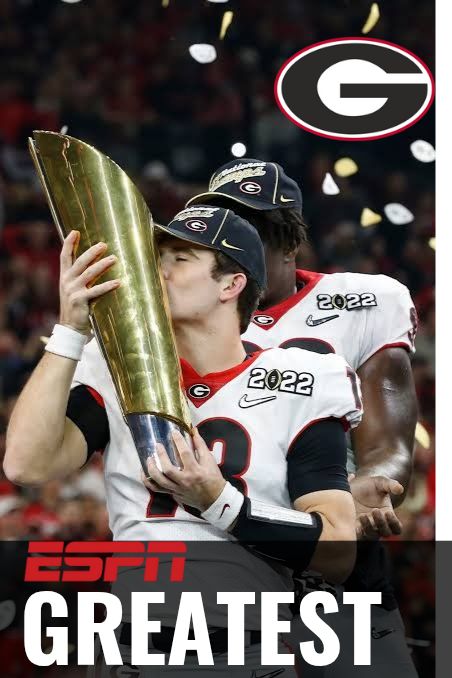If Not Bulldogs, Then Who Else? The Fierce Debate Over Georgia’s Claim as College Football’s Greatest Dynasty
The world of college football is no stranger to passionate debates and intense rivalries, but few discussions have ignited as much controversy as ESPN’s recent proclamation that the Georgia Bulldogs are the greatest college football team of all time. This bold declaration has stirred a storm among fans, analysts, and historians alike, challenging the very fabric of how greatness is measured in college football. As the Bulldogs bask in their well-earned spotlight, questions emerge: Is Georgia truly the undisputed powerhouse, or have we overlooked other legendary programs whose legacies are equally, if not more, deserving of such praise? This essay dives deep into the complexities of this debate, exploring the nuances of college football greatness and why ESPN’s assertion has struck such a nerve in the football community.
To understand the uproar, it’s essential first to recognize what ESPN’s claim entails. Labeling the Georgia Bulldogs as the greatest team ever implies that their recent dominance, historical achievements, and cultural impact outshine the titans of college football history. Georgia’s recent national championships, particularly the back-to-back titles in 2021 and 2022, underscore a period of supremacy rarely seen in the modern era. Their combination of a ferocious defense, explosive offense, and coaching stability under Kirby Smart has created a blueprint for excellence that many programs strive to emulate.
However, college football is a landscape rich with tradition, and its history is dotted with numerous dynasties that have defined the sport at various points in time. When ESPN made their claim, they effectively invited comparison to historic programs like Alabama under Nick Saban, Notre Dame’s golden eras, Oklahoma’s dominant runs in the mid-20th century, and the powerhouse teams of Ohio State, Michigan, USC, and others. Each of these programs brings with them an impressive collection of national titles, Heisman Trophy winners, iconic coaches, and cultural significance.
Take Alabama, for instance. The Crimson Tide, under Nick Saban, have been the benchmark for modern college football dominance. With multiple national championships in the last decade alone and a legacy that stretches back through legendary figures like Bear Bryant, Alabama’s claim to greatness is formidable. ESPN’s declaration, while acknowledging Georgia’s current reign, seems to sideline Alabama’s sustained excellence and the program’s historical contributions to the sport’s evolution.
Similarly, Notre Dame’s impact on college football goes beyond just wins and losses. Their history is intertwined with the very growth of college football as a national pastime. The Fighting Irish have claimed multiple national championships, produced numerous All-Americans, and maintained a cultural aura that few programs can match. Their rivalries, tradition, and influence extend far beyond the field, making any comparison with Georgia’s relatively recent rise complex and multifaceted.
Oklahoma’s dominance in the 1950s and 1970s, Michigan’s consistency as a winning program, and USC’s legendary teams in the 2000s also contribute to a rich tapestry of excellence that challenges any single team’s claim to being the greatest. These programs have their own unique stories of glory, legendary players, and transformational coaches. To dismiss these legacies is to overlook the very fabric of college football’s heritage.
Beyond the tangible metrics of championships and winning percentages, greatness in college football is also about cultural impact and the way a program shapes the identity of the sport. Georgia’s Bulldogs have undeniably galvanized a passionate fan base and helped elevate the SEC’s reputation as the pinnacle of college football competition. Yet, many argue that this is just one chapter in an ongoing narrative, not the final word on the sport’s history.
The controversy also highlights how the modern media landscape influences perceptions of greatness. ESPN, as a major sports network, plays a significant role in shaping narratives around college football. Their coverage, commentary, and rankings reach millions of viewers, making their declarations particularly influential. However, such proclamations are often met with skepticism because they can appear to be driven by current trends rather than a comprehensive understanding of the sport’s history.
The debate over Georgia’s status has also exposed the deeply emotional connection fans have with their teams. For some, ESPN’s statement is a validation of the Bulldogs’ hard work and recent success, a long-awaited recognition of a program that has often been overshadowed by its SEC peers. For others, it feels like a dismissal of decades—sometimes centuries—of tradition and success from other storied programs.
Interestingly, this controversy reveals how college football greatness is inherently subjective. What makes a team “the greatest” can depend on which criteria one prioritizes: is it the sheer number of national titles? The consistency of success over decades? The quality and influence of coaching? The development of legendary players? Or perhaps the cultural and emotional impact on fans and communities? The answer, inevitably, varies depending on who you ask.
In dissecting ESPN’s declaration, it’s important to consider the shifting landscape of college football. The sport has evolved dramatically over the decades, with changes in scholarship rules, playoff systems, and recruiting dynamics. Comparing teams across eras is notoriously difficult due to these shifts, yet it remains a favorite pastime for fans and analysts. Georgia’s recent dominance in a highly competitive era might weigh heavily in their favor, but this doesn’t erase the achievements of teams that thrived under different conditions.
Moreover, the very nature of college football’s fragmented history—with multiple organizations crowning national champions, polls varying widely, and the lack of a definitive playoff system until recently—adds layers of complexity to the debate. The Bulldogs’ recent championships come from a clear playoff system, but many of the historic titles held by other programs were awarded under different criteria, making direct comparisons challenging.
This controversy also shines a light on the power of narratives in sports. ESPN’s proclamation can be seen as an attempt to craft a compelling story that captures the current zeitgeist of college football. It elevates Georgia’s recent achievements into a historical context that resonates with today’s fans, perhaps at the expense of a more balanced historical perspective. Whether this narrative holds up over time will depend on how future seasons unfold and whether Georgia can maintain their excellence.
In the end, the question “If not Bulldogs, then who else?” may not have a definitive answer. Instead, it invites ongoing discussion, appreciation for the rich history of college football, and recognition that greatness is multi-dimensional and ever-evolving. Georgia’s Bulldogs have undoubtedly earned their place among the elite, but their claim as the greatest of all time remains, for now, a topic ripe for debate rather than settled fact.
As fans continue to argue, cheer, and sometimes clash over this question, what remains clear is that college football’s greatest stories are those woven through rivalry, tradition, and the relentless pursuit of excellence. Whether Georgia stands atop the mountain or another program ultimately claims the title of “greatest,” the sport itself is richer for the passionate conversations it inspires.



